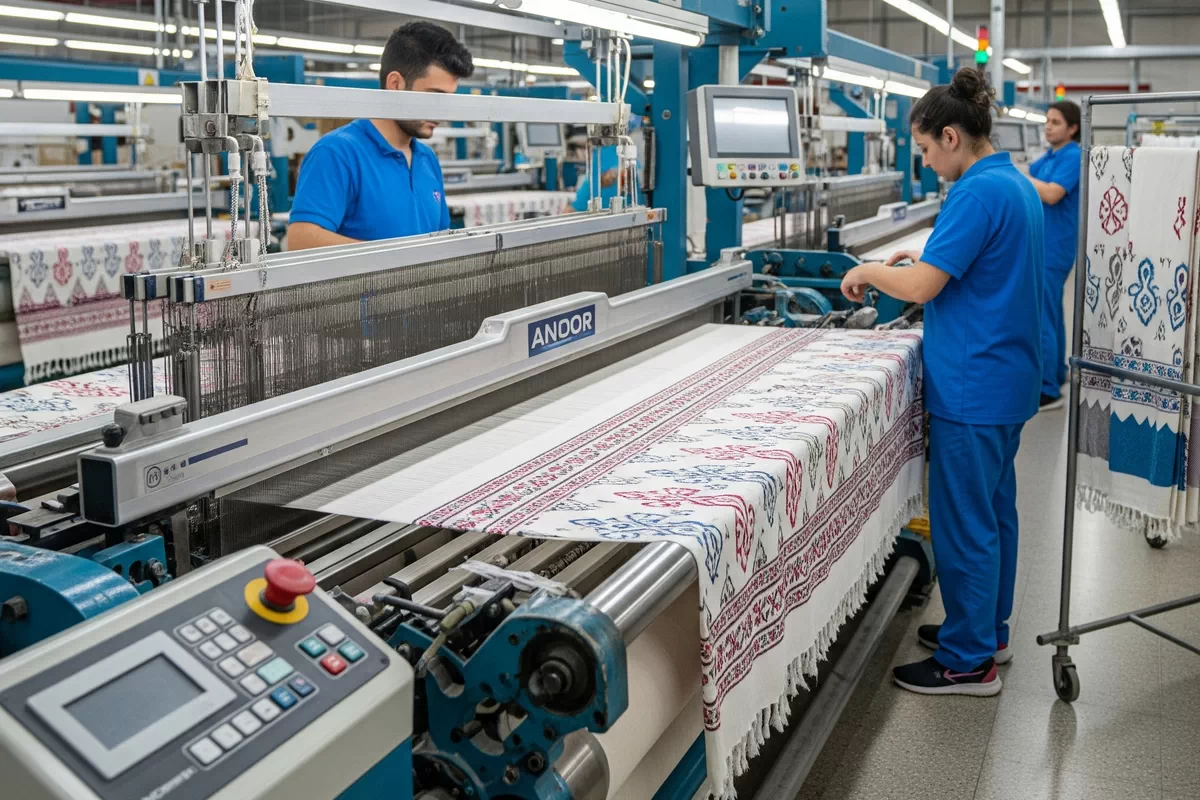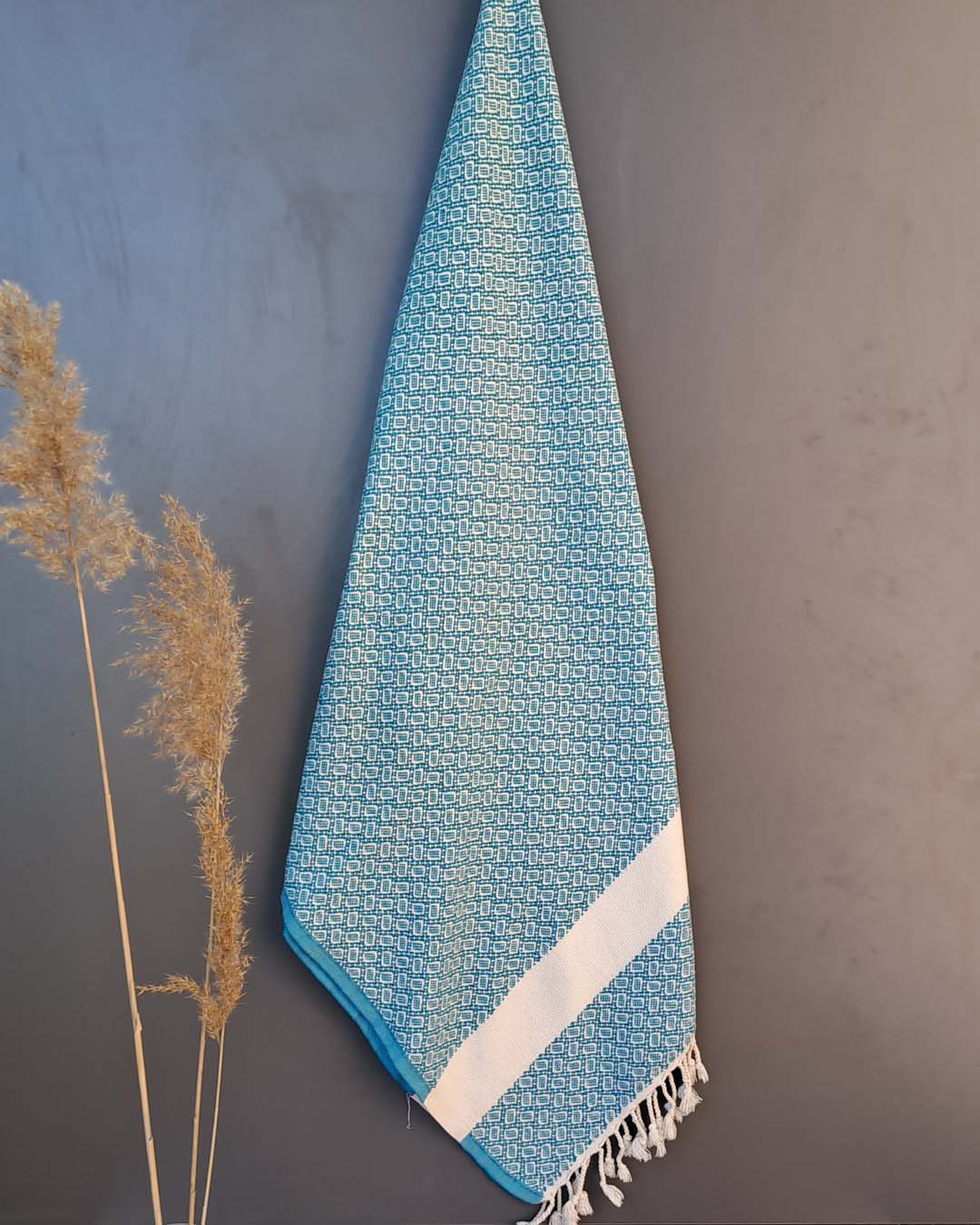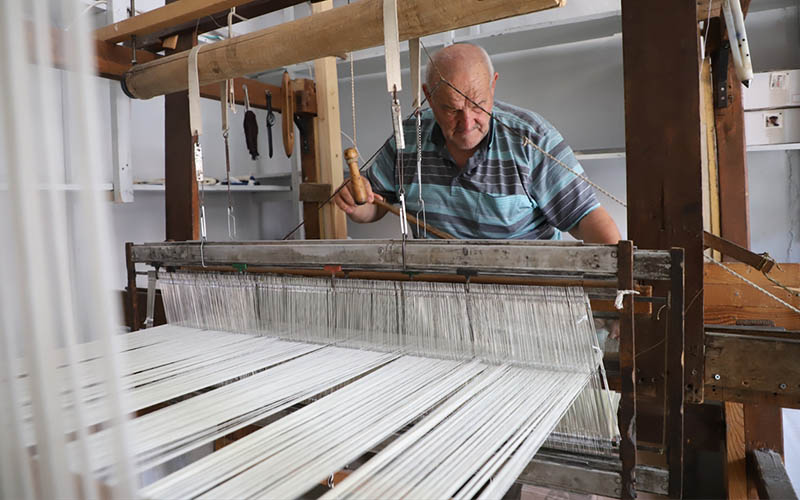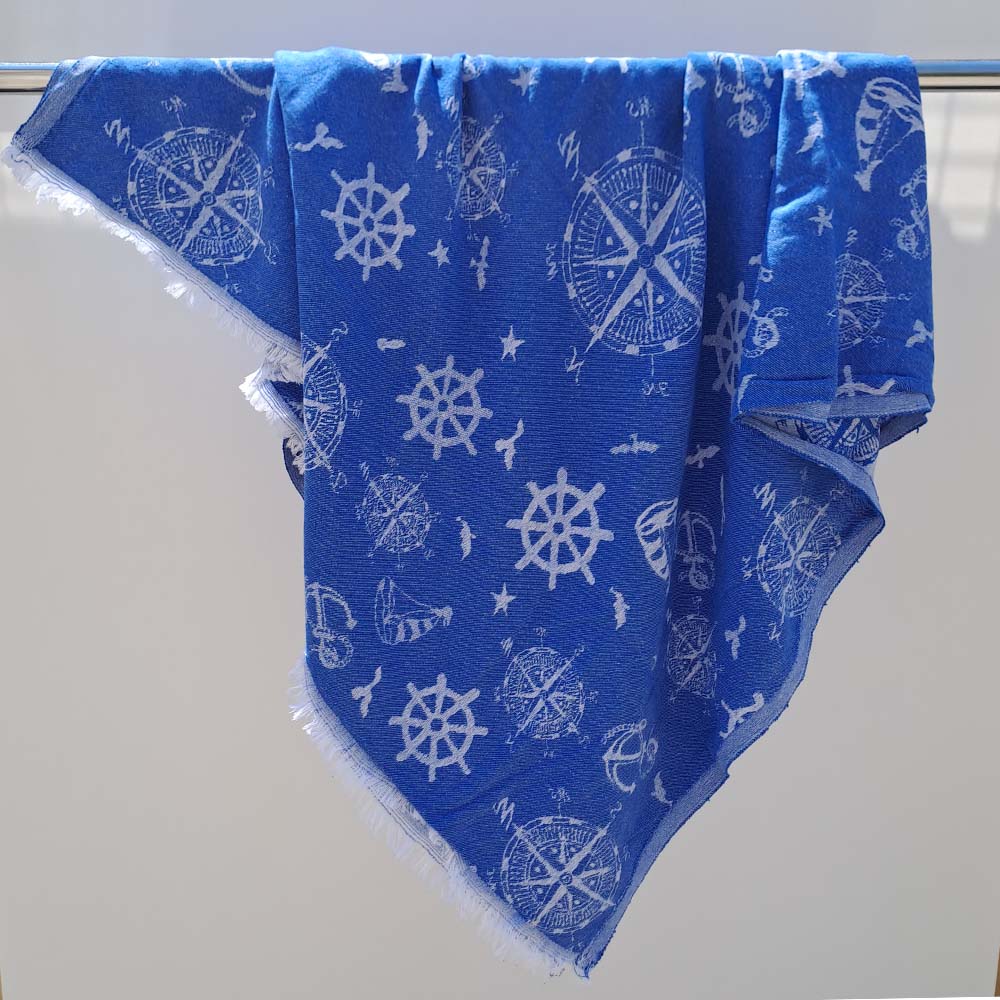One of the first questions businesses looking to place a wholesale peştemal order ask is: “How much does it cost?”
However, the peştemal weaving industry is quite different from fixed-price products. This is because each production process depends on many variables, from the type of yarn used to the order quantity, weaving technique, and special design requests.
A peştemal is not just a towel; it is considered both a traditional handicraft and a promotional product that contributes to branding. Therefore, understanding the factors that affect the price in a transparent and technical language before making a wholesale purchase can provide long-term gains for your business.
In this article, we will cover the 9 most important factors that determine wholesale peshtemal weaving prices in detail. If you want to have custom production made for your brand, place an order for high-quality peştemal, or review your current purchasing strategy, this content is just for you.

1. Raw Material Quality: The Essential Element of Peştemal
The most critical factor affecting wholesale peştemal prices is undoubtedly the quality of the yarn used. This is because a peştemal’s absorbency, durability, softness, and even its lifespan are directly dependent on the raw material.
100% Cotton or Blend?
The most preferred type of yarn in peştemals is 100% Turkish cotton. Especially cotton from the Aegean Region, with its long fiber structure and breathable texture, is ideal for high-quality weaving.
However, some manufacturers may use polyester blend yarn to reduce costs. This reduces both the comfort and durability of the product.
Our recommendation: When comparing prices, make sure that “100% cotton” is clearly stated. Cheap offers usually contain blended yarn, which means compromising on quality.
Alternative Yarns: Bamboo, Linen, Recycled Cotton
- Bamboo: An eco-friendly alternative with natural shine and antibacterial properties. It is usually slightly more expensive than cotton.
- Linen: Preferred by brands seeking a finer, more elegant feel, it appeals to the luxury segment.
- Regenerated Cotton (recycled): Ideal for sustainability projects, but some physical performance may be compromised.
Note: The type of raw material, supply time, and seasonal price increases are also background dynamics that affect the total cost.
2. Weave Type and Pattern Complexity: Defines the Character of the Towel
Not only the raw material of the peştemal, but also how it is woven and which patterns it is produced with directly affect its price. This is because the weaving style determines the production time and labor—which is the basis of the cost.
Hand-woven or Machine-woven?
- Hand-woven peştemals are usually produced in limited quantities on traditional looms with high manual labor. Each one may have slight differences and appeals to the premium customer segment with its authentic look. Therefore, the price is higher.
- Machine-woven peştemals are suitable for mass production. They are ideal for hotels, spa chains, or export-oriented wholesalers. The price may be more economical, but the quality still varies depending on the selected yarn and level of craftsmanship.
How Do Pattern and Number of Colors Affect Price?
- Jacquard weaving (a system where the pattern is created during weaving) requires a more complex production process. It is preferred for specially patterned or logoed towels.
- Plain weaving (simpler pattern structures) is generally used for standard towels and is less expensive.
- As the number of colors increases, yarn preparation and production time increase, which raises the price.
Example:
The unit price difference between a standard striped peştemal and a brand-specific jacquard-woven peştemal with a logo can be as high as 20–30%.

3. Order Quantity (MOQ) and Cost Relationship: The More You Order, the More Cost-Effective It Is
One of the most strategic factors affecting prices in wholesale peştemal production is the order quantity. From the manufacturer’s perspective, orders below a certain quantity can be inefficient in terms of both time and cost. This is where the concept of Minimum Order Quantity (MOQ) comes into play.
What is MOQ and Why Does it Exist?
The minimum order quantity is the lowest production quantity accepted by the manufacturer.
For example:
- For a standard plain-colored peştemal, the MOQ is usually between 100-250 pieces.
- For custom weaves, logoed, or jacquard models, this limit can reach up to 500 pieces.
This limit is necessary for the manufacturer to cover their costs and make the process efficient.
How Does the Unit Price Decrease?
- 100-piece order → Unit price: $65
- 500-piece order → Unit price: $48
- 1000+ order → Unit price: 42 TL
The example table above shows how economies of scale come into play as the quantity increases. This is a win-win situation for both the manufacturer and the buyer.
Why is ordering a small quantity more expensive?
- There are fixed costs such as fabric preparation, machine setup, and color charting.
- Even if you order 100 units, these costs remain the same.
- Therefore, low-volume production increases the unit price.
Our recommendation: When placing a wholesale order, aim for the optimal quantity rather than the minimum quantity you need. This way, you will get a better price and gain flexibility in inventory management.
4. Custom Production Requests: Logo, Label, and Packaging Costs
When placing a wholesale peştemal order, many brands or businesses are not satisfied with just the standard product; they want to customize the product according to their corporate identity. However, these requests can have a direct impact on the total cost.
Custom Label and Logo Printing
- There are different types available, such as woven labels, printed labels, or labels containing washing instructions.
- These labels are usually communicated to the manufacturer at the beginning of the order, and their assembly is a separate production stage.
- If logo printing (screen print, digital printing, embroidery, etc.) is to be applied, different equipment and processing times are required for each technique.
Average label cost: $0.20–$0.40 per piece
Logo printing cost: $0.40–$1.20 per piece (depending on the type of printing)
Packaging Options and Extra Costs
When purchasing wholesale towels, how the product is packaged is a service that is not included in the price but is often requested.
- Transparent bag: The most affordable and commonly used type of packaging
- Jute string + kraft paper wrapping: Gives a handmade feel, costs between 2-4 TL
- Special box or pouch: A strong choice for brand image, but costly (5-15 TL)
Especially for products intended as gifts or for retail sale, custom packaging increases the selling price and should therefore be considered an investment.
Note: All these special requests may also affect the production time. As the preparation process lengthens, the delivery date may be postponed; therefore, early planning is critical.
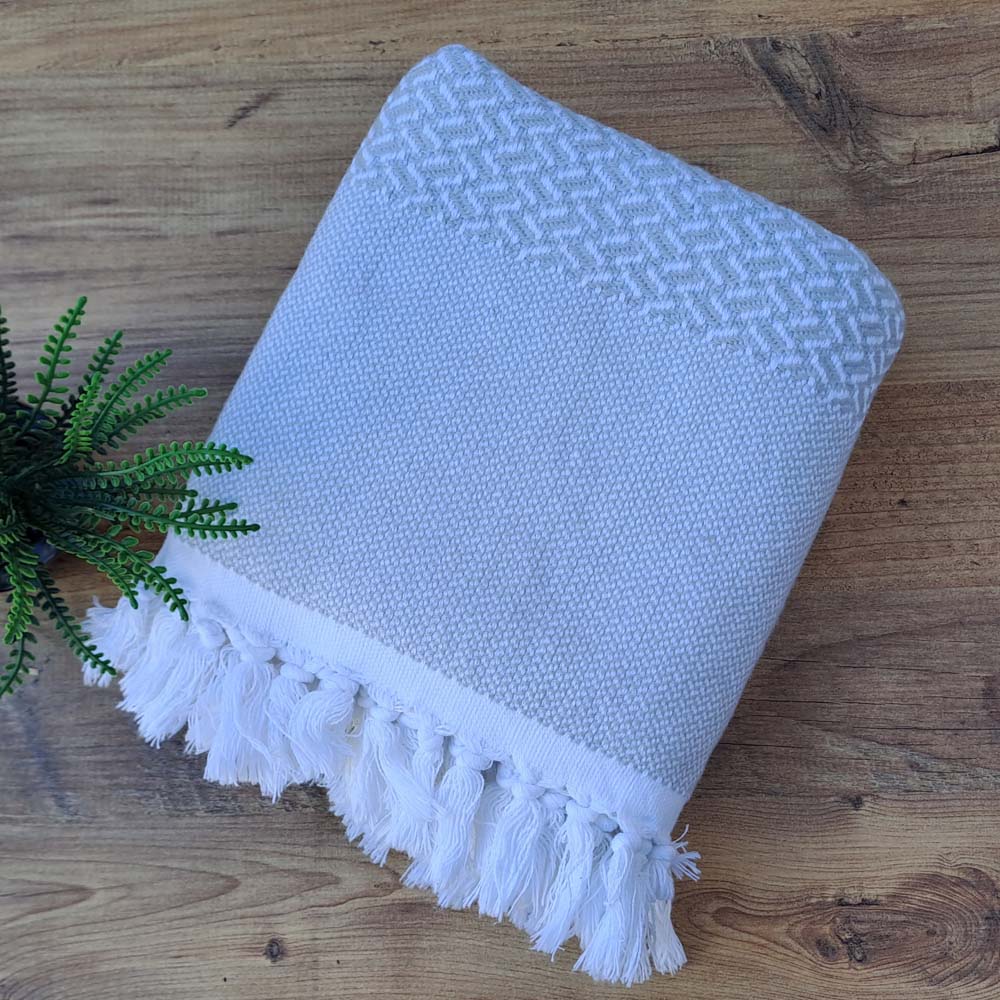
5. Size and Weight Options: The Size of the Peştemal Determines the Price
Another factor that is often overlooked but is very important in the variability of wholesale peştemal prices is the difference in size and weight. This is because every centimeter of fabric and every gram of thread affects both the raw material and labor costs.
What Are Standard Sizes?
Some standard sizes commonly used for peştemals are:
- 90 x 170 cm → The most preferred, classic size
- 100 x 180 cm → More comfortable for spa and hotel use
- 70 x 140 cm → Bath towel or children’s peştemal
- 50 x 100 cm → Hand towel or for promotional purposes
Larger sizes mean more yarn, longer weaving time, and generally a higher price.
What Does Weight (Weight per m²) Mean?
The weight of a peştemal determines its thickness and softness. Two peştemals of the same size may have different prices due to differences in weight.
- 220–250 g/m² → Lightweight, ideal for summer use
- 300–350 g/m² → Medium thickness, both absorbent and durable
- 400+ g/m² → Products offering a luxurious feel, specifically for the hotel and spa segment
Example:
The unit price difference between a 250 g/m² peştemal and a 350 g/m² peştemal measuring 90×170 cm can be up to 6–10 TL.
Remember: Higher weight does not always mean better quality. The right size and weight should be chosen according to the intended use. Lightweight towels are ideal for the beach, while heavier ones are preferred for hotel use.
6. Delivery Time and Shipping Options: The Impact of Speed and Logistics on Price
In wholesale towel orders, it is often not just the production cost, but also the delivery time and logistics preference that are among the important factors affecting the final price.
Rush Orders: Fast Delivery, Extra Cost
Towel production requires a specific planning and preparation process. However, some customers request expedited delivery for special events such as promotional campaigns, season openings, or trade shows.
- In this case, the manufacturer may increase shifts or give priority, which incurs labor and planning costs.
- In urgent production requests, the unit price can often increase by 10-20%.
Example: A request for “1000 peştemals with a special logo within 7 days” creates a price difference compared to the standard schedule.
Shipping Method: Is Shipping Included? Exworks?
When requesting a wholesale peştemal price quote, the following details must be clarified:
- Is shipping included in the price?
- Is it EXW (delivery from Denizli), or are delivery types such as FOB / CIF / DDP involved?
For domestic purchases:
- It may be more appropriate for the buyer to organize shipping.
- However, for shipments outside major cities, the freight company working with the manufacturer may offer advantages.
For international export requests:
- The logistics process becomes much more complex.
- Customs clearance, transportation, insurance, etc. can significantly increase costs.
Note: When comparing prices, it must be specified whether it is a “door delivery price or a factory delivery price.”
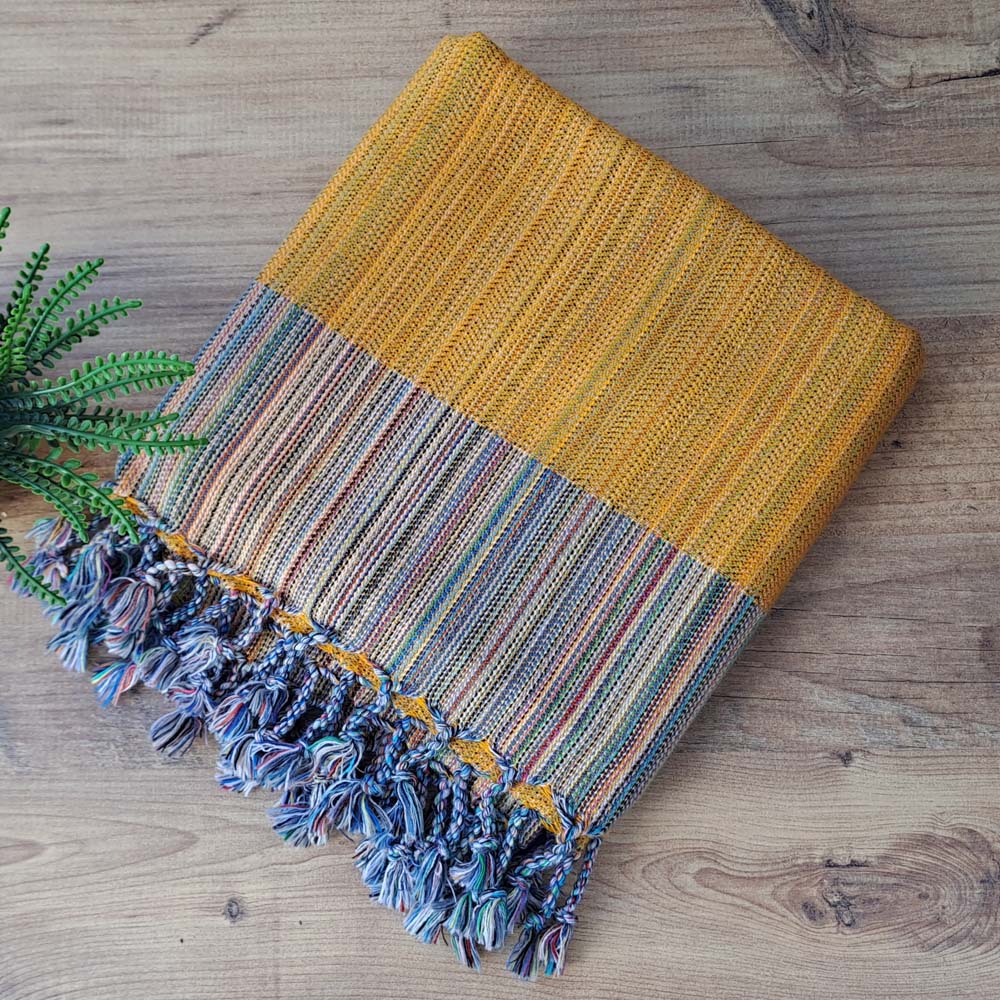
7. Seasonal Demand and Market Conditions: How Does Supply and Demand Balance Affect Prices?
Wholesale peştemal prices are shaped not only by the production process, but also by external factors such as seasonal demand fluctuations and the global cotton market.
High Season: Prices Rise, Delivery Times Extend
Peshtemal is in high demand, especially during the summer months in sectors such as beaches, hotels, and spas.
- Between March and July, order requests increase significantly.
- This high demand can drive up raw material prices, tighten production schedules, and make rush orders even more costly.
Therefore, early planning for wholesale orders is critical in terms of both price advantage and production guarantee.
Low Season: Bargaining Power Increases
- Demand decreases during the winter months, and manufacturers can offer more flexible prices.
- This is the best time for new model development, stock replenishment, or promotional purchases.
Global Impacts: Cotton Prices and Exchange Rates
- Cotton prices can fluctuate on world markets. Producers in Turkey are directly affected by these prices.
- The USD/TL exchange rate plays a decisive role in wholesale prices, especially for companies that work with foreign currency.
Example:
An additional tax on cotton imports can increase the price for domestic producers by 10%. Similarly, a sudden jump in the exchange rate is also reflected in the cost of raw materials.
Our recommendation:
Analyze seasonal campaign periods carefully. Consider the market conditions of the period in which you will place your order.
8. Producer Experience and Quality Control Processes: It’s Not Just About Price, It’s About Trust
When buying wholesale peştemal, it is just as important to guarantee the quality and consistency of the product as it is to find the cheapest price. At this point, the producer’s experience and the quality control processes they implement come into play.
What Does an Experienced Manufacturer Provide?
- They offer know-how at every stage, from raw material selection to color fastness.
- They can maintain the same quality standard even for large orders.
- They stick to the delivery time, so you won’t encounter any surprises.
- They provide confidence with quality certificates such as export documents and OEKO-TEX certificates.
Getting a quote from a newly established company may seem attractive; however, hidden costs such as delivery delays, color inconsistencies, or weaving errors may arise.
What Does the Quality Control Process Cover?
- Yarn Testing: Tensile strength and blend ratio are checked.
- Weaving Inspection: Pattern symmetry and warp-weft density are examined.
- Dyeing and Color Fastness: Tests are conducted to prevent color bleeding.
- Cutting and Sewing Quality: The edge workmanship of each product is checked.
- Label and Packaging Inspection: The accuracy of the desired brand details is confirmed.
Experienced manufacturers typically ensure quality control at every stage. This translates to a lower return rate, more satisfied customers, and long-term partnerships.
Remember: A cheap product can be costly if it damages your brand. The manufacturer’s expertise is as crucial as price for long-term success.
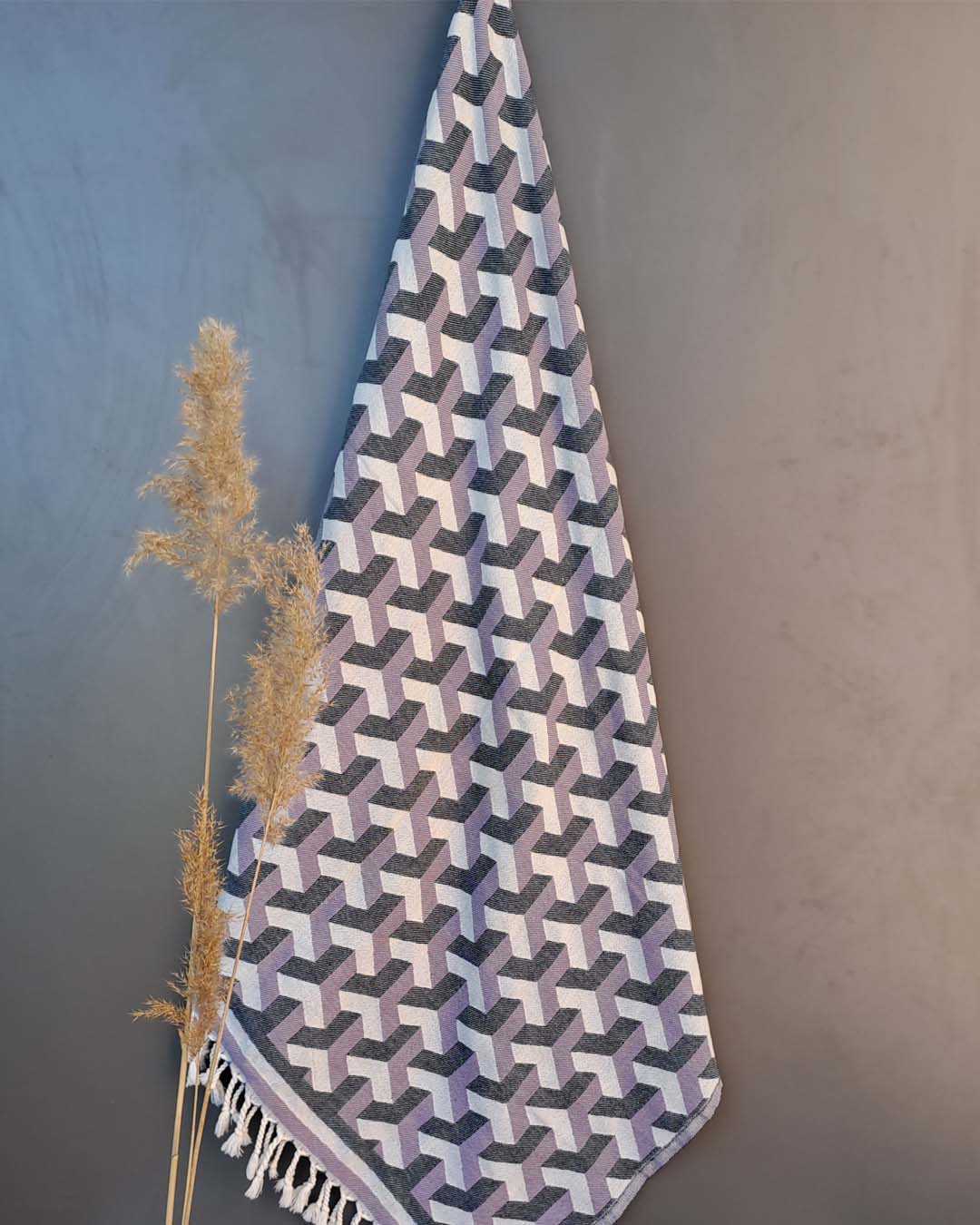
9. Things to Consider When Buying Wholesale Peştemal
(Summary and Practical Checklist)
Buying wholesale peştemal may seem like a simple ordering process at first glance, but it actually involves many critical elements that require attention. Working with the right manufacturer makes a big difference in terms of your brand’s reputation and customer satisfaction.
You can secure your process with the following checklist:
Wholesale Peştemal Purchase Checklist:
| Check Point | Explanation |
|---|---|
| 1. Material Quality | Is it clearly stated as 100% cotton, bamboo, or custom blends? |
| 2. Weaving Type | Is it handwoven or machine-made? Jacquard or plain? |
| 3. Size & GSM | Are the dimensions and weight appropriate for your needs? |
| 4. Customization | Are logo, label, and packaging requests clearly defined? |
| 5. MOQ (Minimum Order Quantity) | Does your order meet the supplier’s minimum quantity requirements? |
| 6. Delivery Time | Is the lead time clearly stated? Are urgent order terms discussed? |
| 7. Shipping & Logistics | Is the price inclusive of shipping? Are terms like EXW/DDP clarified? |
| 8. Seasonal Planning | Does your order date fall into peak season? Are costs evaluated accordingly? |
| 9. Supplier Credibility | Have references, past work, and quality certifications been verified? |
Wholesale peştemal towel production is a strategic process that combines price, quality, timing, and trust. Rather than simply seeking affordable products, working with the right manufacturer will be the best investment for your brand in the long term.
Contact Us for the Right Wholesale Peştemal Solution for You
If you want to have wholesale peştemal towel production made for your brand with high quality and competitive prices, you’ve come to the right place. With years of weaving experience, we offer you customized solutions, whether you want simple or specially designed models. We plan the entire process for you, from the minimum order quantity to special label and packaging requests.
👉 For detailed information or to place a sample order, visit our website Dokuyorum.com or contact us directly.


